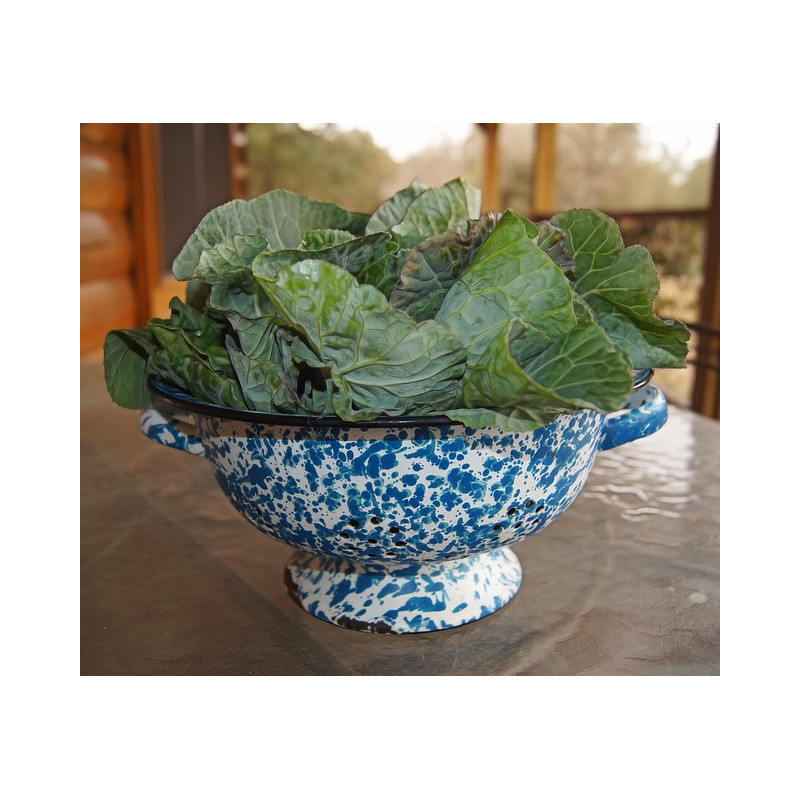






COLLARDS - GEORGIA SOUTHERN
Brassica oleracea var acephala
Collards belong to the cabbage family and look similar to Kale or cabbage but with no head formed. The leaves are a rich blue green colour and should be harvested individually, like kale rather than cut at the base like a cabbage. The leaves are produced all year round but taste best in cooler months. Collards contain multiple nutrients with potent anticancer properties. The leaves can be cooked as you would cook, Kale, Cabbage or Silverbeet. Collards eaten widely in USA and common in Europe. They are eaten with nearly every meal in Kashmir. The roots of collards are often cooked for use in stirfries and soups.
Sow the seeds Sept -Mar in Cool and Temperate climates and from Mar-July in both Tropical and Subtropical regions. Plant the seeds 0.5-1cm deep about 20-30cm apart in rows 40-60cm apart. Ensure the soil is well composted and moist throughout the growth of the plant as it is fast growing. It will mature in 42 days with baby leaves available in just 28-30 days.
QTY 260 seeds
 Security policy
Security policy
The site is checked on a regular basis
 Delivery policy
Delivery policy
Seeds are sent within 2 business days of payment receipt,parcels include tracking
 Return policy
Return policy
Items can be returned within 7 days of receipt provided they are in as received condition
COLLARDS - GEORGIA SOUTHERN
Brassica oleracea var acephala
Collards belong to the cabbage family and look similar to Kale or cabbage but with no head formed. The leaves are a rich blue green colour and should be harvested individually, like kale rather than cut at the base like a cabbage. The leaves are produced all year round but taste best in cooler months. Collards contain multiple nutrients with potent anticancer properties. The leaves can be cooked as you would cook, Kale, Cabbage or Silverbeet. Collards eaten widely in USA and common in Europe. They are eaten with nearly every meal in Kashmir. The roots of collards are often cooked for use in stirfries and soups.
Sow the seeds Sept -Mar in Cool and Temperate climates and from Mar-July in both Tropical and Subtropical regions. Plant the seeds 0.5-1cm deep about 20-30cm apart in rows 40-60cm apart. Ensure the soil is well composted and moist throughout the growth of the plant as it is fast growing. It will mature in 42 days with baby leaves available in just 28-30 days.
QTY 260 seeds

COLLARDS - GEORGIA SOUTHERN
Brassica oleracea var acephala
Collards belong to the cabbage family and look similar to Kale or cabbage but with no head formed. The leaves are a rich blue green colour and should be harvested individually, like kale rather than cut at the base like a cabbage. The leaves are produced all year round but taste best in cooler months. Collards contain multiple nutrients with potent anticancer properties. The leaves can be cooked as you would cook, Kale, Cabbage or Silverbeet. Collards eaten widely in USA and common in Europe. They are eaten with nearly every meal in Kashmir. The roots of collards are often cooked for use in stirfries and soups.
Sow the seeds Sept -Mar in Cool and Temperate climates and from Mar-July in both Tropical and Subtropical regions. Plant the seeds 0.5-1cm deep about 20-30cm apart in rows 40-60cm apart. Ensure the soil is well composted and moist throughout the growth of the plant as it is fast growing. It will mature in 42 days with baby leaves available in just 28-30 days.
QTY 260 seeds